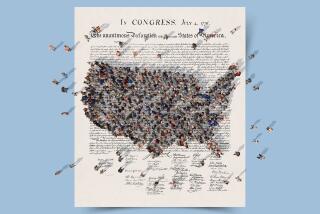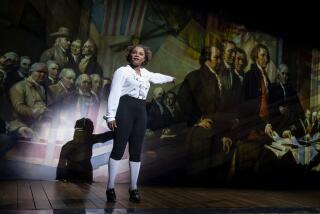The war most Americans forget
DOLLEY MADISON was determined to hold her ground. It was a Wednesday in August 1814, in the middle of her young nation’s war against Britain, and she remained in the White House while her husband, President James Madison, was with the American troops in Maryland. Things were bleak: The enemy was within 20 miles. Gen. Robert Ross, the British commander, had hoped to avoid a direct assault on the capital, but colleagues persuaded him to press on, the historian A.J. Langguth writes in his engaging and entertaining new history of the war, because to fail to storm Washington “would be a stain on their honor.”
Honor was very much on Dolley Madison’s mind too. The president already had sent government documents out of the city, and he tried to cheer his wife with reassuring notes from the front, telling her that their troops “are in high spirits & make a good appearance.” Nevertheless, the first lady understood what was coming. Much of official Washington had fled, but she would wait for her husband -- and stay at her post. Though raised a Quaker, Dolley Madison kept a Tunisian saber at hand. “I have always been an advocate of fighting when assailed,” she once said. As the British closed in, she could hear the sound of cannons, yet there was no sign of the president: “Mr. Madison comes not; may God protect him!” she wrote a sister. Only after she became convinced that becoming a captive of the enemy would be worse than fleeing, she left in a wagon filled with the White House silver and a large oil portrait of George Washington -- the closest thing, perhaps, the Republic had to a sacred relic at that juncture. (Ross later claimed he would have conducted himself with grace. “I would rather protect, than burn, a house which sheltered so excellent a lady,” he said.) And so the capital fell to America’s former colonial masters, only 38 summers after the Declaration of Independence.
With her courage and common sense, Dolley Madison largely reflected the character of the nation over which her husband presided. The strength of Langguth’s book, “Union 1812,” lies in its keen appreciation of the personalities of the American figures (and more than a few British ones) who played pivotal roles in what is, oddly, one of the most important yet least-remembered events in our history, what Langguth calls “the second war of independence.” The War of 1812, like the Nullification Crisis of 1832-33, is obscured by the understandably long shadows of the Revolution and the Civil War. We are in Langguth’s debt, then, for this vivid retelling of the story of a war that still has everything to do with who we are and how we got this way.
Langguth, author of the popular “Patriots: The Men Who Started the American Revolution,” paints human portraits with skill and grace. “Union 1812” is a Plutarchan undertaking, with the larger story of politics and war told through the lives of presidents Washington, Adams, Jefferson and Jackson, the Madisons and lesser-known figures such as Zebulon Pike. The book has a lovely narrative pace, beginning with the early crises in the life of the republic as the Articles of Confederation gave way to the Constitution, which faced its own tests as the nation grappled with the balance of power between the federal government and the states. (This perennial question would cost American blood and treasure for nearly two centuries, from the Whiskey Rebellion to the civil rights movement.)
The march to war began, in a way, in June 1807, when a British vessel, the Leopard, opened fire on an American frigate, the Chesapeake, after the Americans declined to allow the British to board in search of suspected British deserters. The British had now, Langguth writes, “challenged America’s honor in a way no president could ignore.” The president was Jefferson, who, hearing the nation’s cries of “death before dishonor,” remarked that “never since the battle of Lexington have I seen the country in such a state of exasperation.” Our pride was wounded, our sovereignty questioned, our territory effectively violated -- little wonder that the result, an embargo on U.S. ships sailing to foreign ports, was heavy-handed, and little wonder, too, that after a series of sanctions and restrictions against dealings with Britain, war ultimately came when Madison, now president, proposed reviving Jefferson’s hard-line embargo. Dolley Madison understood it all, writing, “You know of our embargo -- to be followed by War!! Yes, that terrible event is at hand.... “
The War of 1812 was about many things: We coveted Canada, feared encroachment not just by the British but by the French and the Spanish, and we were embarrassed by British challenges on the high seas. Reading Langguth, one is reminded anew of how relevant and resonant the past can be, for the world in which our distant ancestors lived and fought was not so wildly different from ours today in that global forces played a direct role in our political, cultural and economic lives.
The conflict also vindicated the work of the Revolution. As Langguth points out, John Adams had, after his defeat by Jefferson in the bitterly contested election of 1800, wondered whether the American experiment had been such a wonderful idea after all. The years after the Revolution, Adams speculated, may have been an “age of Folly, Vice, Frenzy, Brutality [and] Daemons.” He cheered up, however, after the United States prevailed early in 1815. “He decided that Madison had proved that the Constitution could hold firm through both peace and war,” Langguth writes, “that England could never again conquer America, and that, ship for ship, the U.S. Navy was now equal to any in the world.”
To what should we attribute America’s triumph in its second test against the British? Reading Langguth, I think the combination of bravery and pluck, steeliness and political shrewdness, fortitude and pragmatism often in evidence in our early presidents and among other early leaders, from Dolley Madison to then Gen. Andrew Jackson, kept the American story moving forward when so many other nations’ tales ended in ashes, strife and rancor.
The Madisons lived for decades after they left the White House, making their home at Montpelier, in the Virginia countryside near Jefferson’s Monticello. As James Madison grew ever older, Dolley watched over him, making sure he kept warm -- he needed mittens and scarves even in warmer seasons to ward off the cold. He filled his role as the last of the Founders, occasionally weighing in on the issues of the day well into Jackson’s presidency. Dolley took good care of Madison against the ravages of time, just as she had taken good care of another American institution, the White House, against the ravages of the enemy so long before. She kept the faith, and finished the race -- and, like the country she protected and nurtured -- she held her ground. *
More to Read
Sign up for our Book Club newsletter
Get the latest news, events and more from the Los Angeles Times Book Club, and help us get L.A. reading and talking.
You may occasionally receive promotional content from the Los Angeles Times.






